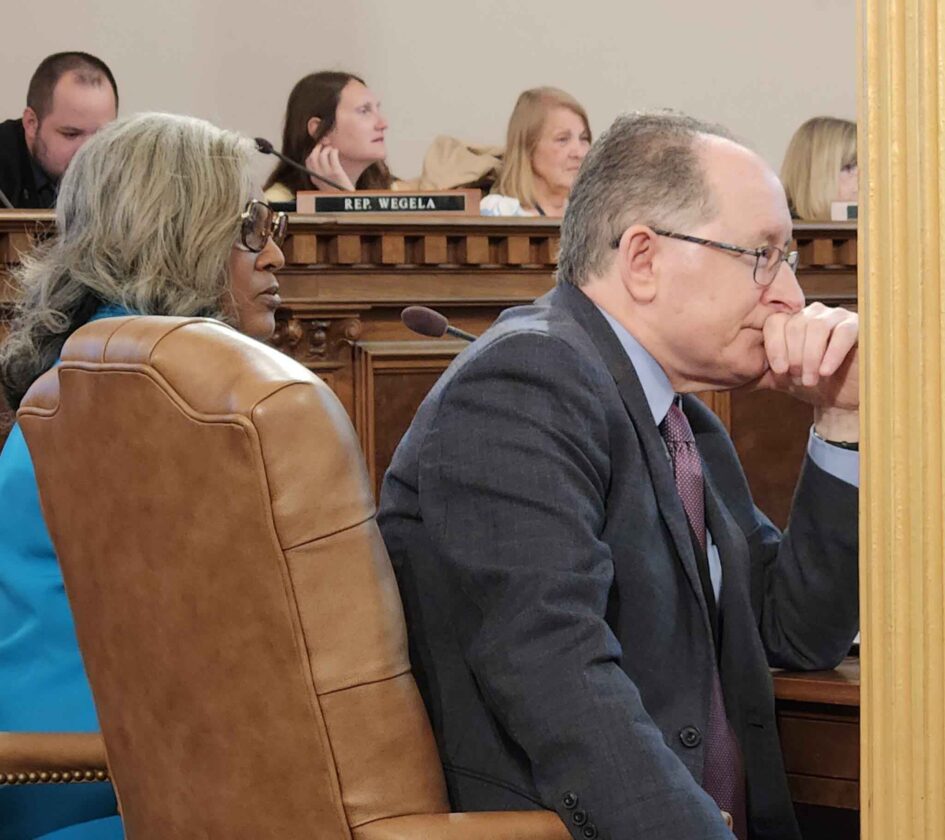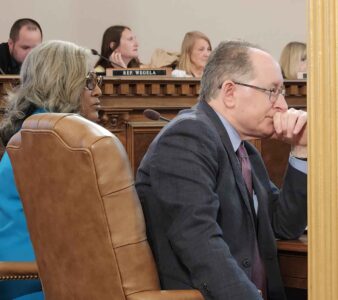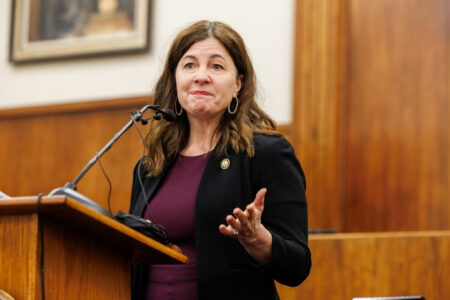Report commissioned by Michigan Department of Education ruffles feathers with education officials

Michigan Board of Education President Pamela Pugh (left) and Michigan Superintendent of Public Instruction Michael Rice (right) listen to members of the Michigan House Oversight Committee on Tuesday, June 3, 2025 (Ben Solis/Michigan Advance)
A recent report commissioned by the Michigan Department of Education has state education officials raising their eyebrows over recommendations that the governor should play a greater role in shaping K-12 education policy.
The $500,000 report produced by the University of Michigan’s Youth Policy Lab offers several recommendations aimed at improving education, centered on the bodies that govern education in the state, the structure of school districts, the state’s school choice system and how Michigan’s education system is funded.
Alongside the report’s release, Department officials released a statement, with state Superintendent Michael Rice saying the department “agrees with some findings in the report and disagrees with others,” and that the report offers no significant new research or insight on education policy or ways to improve student achievement.
Alongside statistical analyses of administrative data, the report also draws from existing academic papers, policy reports and government documents, while incorporating interview and survey responses from several stakeholders including superintendents, school authorizers, representatives from educational associations, education professionals and researchers who have studied Michigan schools and their governing bodies.
The recommendations most hotly contested by the board were proposals to increase the governor’s authority over the State Board of Education and the choice of the state superintendent.
Specifically, the report recommends moving toward a system where at least some members of the State Board of Education are appointed by the governor. It also suggests multiple approaches in giving the governor authority in how a superintendent is selected, ranging from making the role one of the governor’s cabinet positions, to having the governor select a superintendent from a list of candidates provided by the board or requiring the board or the Legislature to approve the governor’s selection for the role.
Currently members of the state board of education are nominated by the state political parties at their nominating conventions. Every two years, Michigan voters select two candidates to serve eight year terms, with members of the State Board of Education appointing the state superintendent to serve as a nonvoting member and chair of the board.
The report acknowledges that any change to this system would likely require changes to state law and the state constitution.
Politicians have mulled several changes to the Board of Education’s structure in recent years with state Rep. Bill G. Schuette (R-Midland) introducing a proposed constitutional amendment earlier this year that would place the governor in control of nominating the state superintendent. Rep. Cam Cavitt (R-Cheboygan) also introduced a bill dividing the state into four districts and requiring state political parties to nominate candidates from all four districts on a rotating cycle, arguing it would improve representation for rural and northern Michigan districts.
In 2024, a bipartisan committee of political consultants sought to partner with the legislature on a proposed constitutional amendment that would have taken the nominating process for attorney general, secretary of state and state Supreme Court justices away from state party conventions and place candidates before voters in the primary election.
One version of their proposed constitutional amendment would have placed candidates for the state Board of Education and the boards for University of Michigan, Michigan State University and Wayne State University before primary voters, while another would have allowed the governor to appoint members to the board of education and the three university boards with the advice and consent from the Senate.
While the report cites a common view amongst stakeholders that the board is ineffective and mired in partisan politics, Board President Pamela Pugh, a Democrat, said proposing giving the governor control over nominations as the solution was laughable. She emphasized that it is the people of Michigan who decide who they want to oversee the board.
“We come from our two different parties, but imagine if a governor were to appoint boards. That would definitely bring politics to the table. And we serve eight year terms. With a governor appointing we could be seeing flip flopping of board members every four years,” Pugh told the Michigan Advance.
Pugh is also a candidate for the Michigan Senate.
In April, the State Board of Education unanimously approved a resolution brought by Tom McMillin, a Republican, to oppose Schuette’s resolution.
“Our board supports many of the efforts that Governor Whitmer has put forward to strengthen education, but this push to expand gubernatorial control over the State Board of Education and the superintendent, it lacked data,” Pugh said, arguing such an effort would undermine the state’s constitutional safeguards.
Additionally, Pugh argued the governor has plenty of influence over the board including their influence on party nominations, their role as an ex-officio member, and the engagement of board liaisons.
“I will tell you that some board liaisons come and they have a name plate, and they sit at the table and they are part of the discussions with us. Some have participated only via Zoom. And so we have those different spectrums of participation, but we definitely welcome the governor, through that liaison, to participate as much as they want,” Pugh said.
When asked about the report and its proposals, Whitmer Press Secretary Stacey LaRouche stressed the governor’s work providing record levels of funding for students, and hiring more teachers and literacy coaches to help address the state’s lagging literacy rates.
“We know we need to get our schools back on track, and improve literacy scores across the state. We remain committed to working with anyone to tackle the literacy crisis and put our students first, so that every kid in Michigan can learn how to read and earn the bright future they deserve,” LaRouche said.
While the changes in governing structure represent the most salient point of disagreement for the Department of Education and the board, Rice highlighted several areas where the board agreed with the report’s findings.
“On finance, the report says we’re underfunded. We agree,” Rice told the Advance.
Similarly the department and the state board agree they should reduce the reliance on categorical funding, though Rice noted they wanted to retain specific categories, including at-risk funding, funding for students with disabilities, mental health and school safety and funds for universal school meals among other categories.
Looking at school of choice, Rice also noted the Board’s support for greater financial accountability for charter schools, as well as greater oversight in where charter schools are sited.
“We have 21 public school districts in Genesee County. We have 14 public school academies in Genesee County with 35 school districts as a result 21 plus 14 for 61,000 children. In Maryland, that’s a school district. That’s a single school district. In Michigan it’s 35 school districts, and it manifests itself in an inefficiency. And that inefficiency manifests itself in terms of a frittering away of resources that would be better spent on children in classrooms,” Rice said.
The state would also do well to have stronger oversight over certain issues, Rice said, pointing to early literacy and early numeracy as examples.
In Fall 2024 Whitmer signed legislation to improve training for teachers in early literacy, require the use of science of reading materials and require dyslexia screenings for all students in Kindergarten through 3rd grade alongside older students who demonstrate behavior indicating dyslexia.
This creates a system of greater required involvement, Rice said.
“This is not an advocacy for changing an authority structure across the board. It’s about the changing of an authority structure in early literacy,” Rice said.
Additionally the department would like to see a coupling with local education agencies, intermediate school districts and the state department on issues like early literacy and early numeracy, Rice said.
While the department and the school district can influence items in the instructional phase, they do not have any sort of authority, he explained, noting any change would require action from lawmakers.
Michigan Advance is part of States Newsroom, the nation’s largest state-focused nonprofit news organization.






